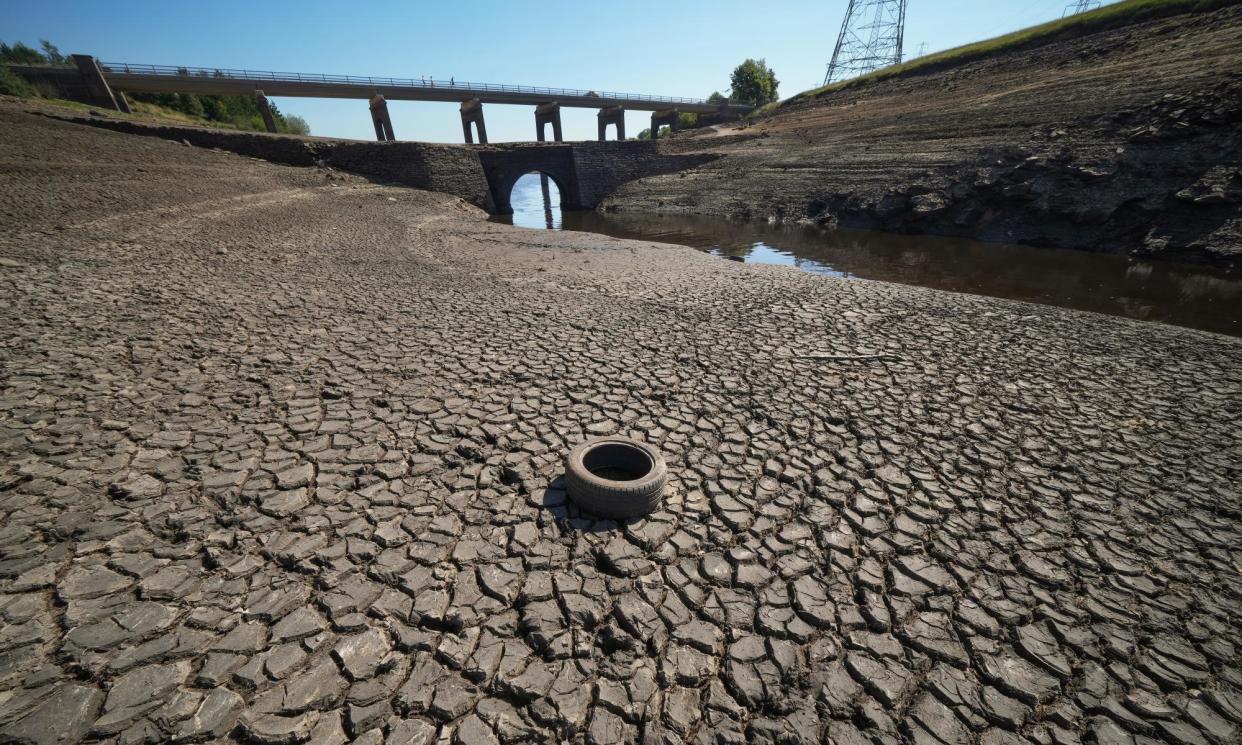UK at risk of summer water shortages and hosepipe bans, scientists warn

The UK could face water shortages and hosepipe bans if this summer is hot and dry, despite having experienced the wettest 18 months since records began.
Leading scientists have said that because the UK is not storing its water properly, the country is vulnerable to the “all or nothing” rain patterns being experienced more frequently due to climate breakdown.
There have been no new major reservoirs built in the past three decades, rivers have been engineered to move water quickly so it runs into towns and cities – causing floods – and the sea, and many wetlands have been drained and farmed or built on. This means the water that pelts the UK in winter is not being stored properly, causing floods followed by water shortages in summer.
The Environment Agency released a report last week that predicts a growing shortfall of water in coming years, leading to a deficit of almost 5bn litres of water a day by 2050. This is more than a third of the 14bn litres of water currently put into public water supply. The shortfall may be revised upwards; without action, draft government plans indicate that by 2050 the nation’s public water supply will face a shortfall of more than 4,800 Ml/day (million litres per day), which has risen from 4,000 Ml/d in the 2021 draft, due to revised forecasts of demand and additional reductions in abstraction to improve the environment.
Shortages in practice mean public supply is prioritised, and agriculture and other businesses being banned from abstraction, forcing them to cease operations for a time. Also likely to happen is a ban on filling swimming pools and ponds, and cleaning public buildings. Hosepipe bans are already in place during hot and dry periods, with people prohibited from using them to wash their cars and water their gardens.
Jamie Hannaford, a hydrologist at the UK Centre for Ecology & Hydrology (UKCEH), said: “It was an extremely wet winter, with England seeing the wettest October to February on record (since 1890). Rainfall was at least twice the February average across central and southern England.
“If there is below-average rainfall sustained over the coming months, especially if temperatures are also high (leading to high evaporation rates and water demand), then this could put pressure on water supplies in areas where there is limited groundwater storage, which rely on rivers and reservoirs for water supply. In these areas (notably, upland northern and western areas) reservoir stocks and river flows can be depleted rapidly during warm, dry spells in spring, even after wet winters – as occurred in the 2010 drought that followed a wet winter and flooding in north-west England.”
Prof Hannah Cloke, who specialises in water at the University of Reading, said: “It is always good for water supply levels to be high as we go into the spring and summer, after a record-breaking wet past 18 months, but it is still possible for regions of the UK to dwindle if we experienced another lengthy dry spell. Unfortunately, these ‘all or nothing’ periods of rainfall we are experiencing in the UK are likely to increase as heat continues to build up in the atmosphere and oceans. We need to realise that our water infrastructure is creaking and required billions of pounds of investment.”
Jo Parker, a chartered civil engineer who has worked in the utility industry for 30 years, said that even after record rainfall there could still be hosepipe bans in the event of a record hot summer.
“The amount of untreated water storage in this country is far lower than we need as there have been no reservoirs built for the last 30 years,” she said.
“Water demand has increased, particularly in the summer, as the population has grown and more people enjoy such things as water features, paddling pools and power washers. Coupled with summer temperatures soaring into the 40s due to climate change,” she added. “Whilst this has not generally lead to widespread problems, it has required some hosepipe bans (or to use its proper terminology, temporary use bans) and some localised shortages which are often due to bottle necks in the distribution network rather than an overall shortage of water.
“Without knowing what the weather will be like this summer it is difficult to predict what will happen.”
Though it has been a wet March, if the following months are dry, as models have suggested they could be, it is possible for the UK to run out of water this summer.
Based on projections, Hannaford said: “While the UK will see increasing river flows in winter, and increasing high flows during periods of flooding, river flows at other times of year will decline, and the lowest flows experienced each summer will be much lower than they are now. Similarly, drought events will become more severe over the coming century. Correspondingly, this will put additional pressure on water supplies during periods when demands are greatest.”
Cloke added: “The UK risks running out of water because our population has grown and continues to grow, our patterns of rainfall are changing due to climate change, and we haven’t yet invested enough in the changes that are needed to plug the gaps. We have already seen in some areas what happens when high demand for water follows prolonged periods of drought: the pipes can run dry.”


